New Literary Television
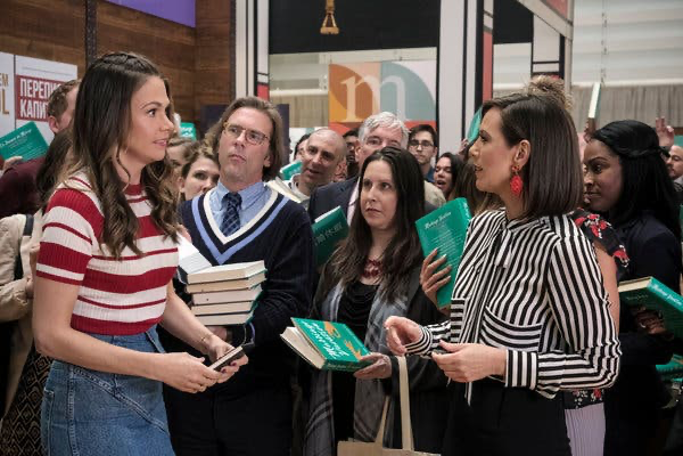
In Younger (2015-2021), the world of publishing is built on puns and parodies. Characters drink Bridget Jones Daiquiris, Margarita Atwoods, and Bloody Mary Shelleys. Stand-ins for Karl Ove Knausgård and John Green publish titles like Kaleidoscope of Life and Hashtag, I'm Dying.
Edward L. L. Moore, a dead ringer for George R. R. Martin, dominates his publishers' income with the bestselling fantasy series Crown of Kings, beloved by Seth Meyers, Misty Copeland, Terry Gross, and Ice T. Even Sex and the City (1997), another book-turned-Darren Star production, gets a loving send up with the evocative trilogy, Man-Hattan, She-Donism, and Goldman Sex.
Puns, like parodies, rely on pre-existing knowledge. You can watch Younger without knowing that P is for Pigeon might also be Helen MacDonald's H is for Hawk (2014), a memoir about falconry, sexual repression, and grief, but when a marketing executive yells "It's a metaphor!!" in reference to the pigeon, the full absurdity won't hit.1 It's not just that shows as glossy as Younger usually avoid Norwegian life-writers, grief memoirs, and YA sick lit: Younger also perfectly skewers the hierarchies and marketization of contemporary literary culture. Whether asking an assistant to add Jane Austen to Tinder and Christian Mingle, Googling the extremely cursed phrase "Selling Joyce Carol Oates to Millennials," or optioning the movie tie-in for Chinua Achebe's African Trilogy, the publishers in Younger talk earnestly about the writers they love, all while thirstily dining off the "Last Days of Books" in couture, at award shows, and through multi-million dollar sponsorship deals.2
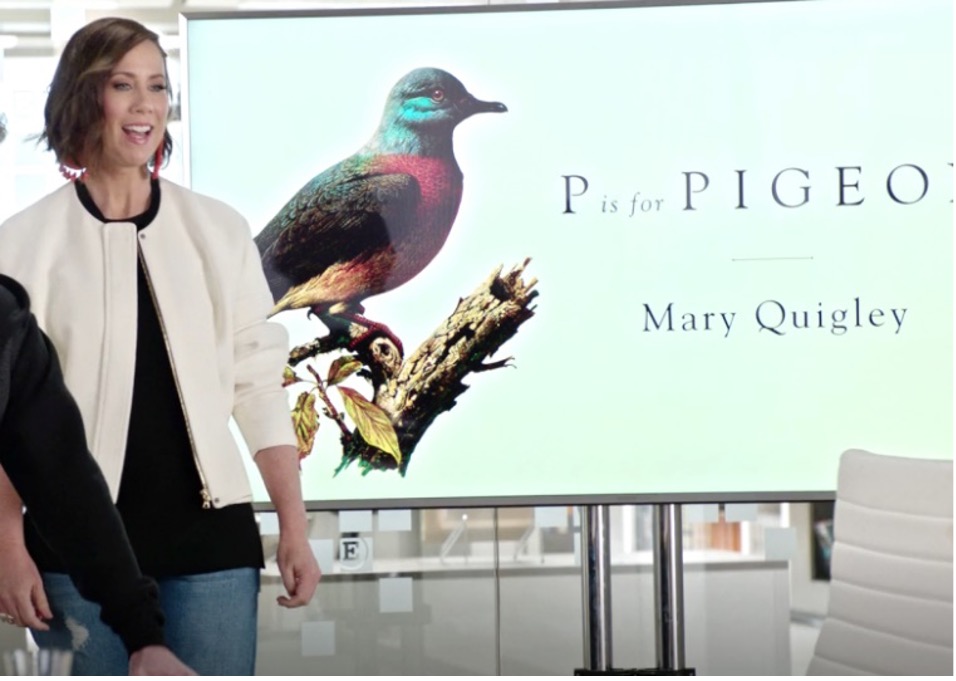
Looking at the representation of publishing in Younger, I'm interested in the show's engagement with millennial readers of literary fiction, its construction and parody of a feminine literary whiteness, and its conceptualization of literary cultures through generational referencing, reading, and riffing. In seven wildly uneven seasons, Younger skewers the corporatization of identity politics and supposed generational divides in literary workplaces in funny and genuinely effective ways. As Sheri-Marie Harrison argues elsewhere in this cluster of I May Destroy You (2020), Younger is profoundly and seriously interested in "the economy of cultural prestige", even when its methods lack the rigor, precision, and genius of Coel's currently peerless text.3 Yet, as I've argued elsewhere about contemporary melodramas like The Good Wife (2009-16), Younger critiques the exclusionary world of publishing only to perpetuate the fantasy of a lucrative and glamourous career for wealthy white women with preexisting knowledge and networks.4 It bases its storylines and occasionally tone-deaf humor in the entirely believable premise that a slim, wealthy woman could look somehow "younger".5 While the show also complicates the perception of millennials as non-readers and so-called "digital natives," Younger is a loving, bitchy, but often frustrating portrait of a bloated and precariously funded industry that says more about contemporary literary culture than almost anything else on TV.6
"The Old Ma'am and the C"
Younger focuses on a forty-year-old, newly-divorced single mother who pretends to be twenty-six to get an entry level job in publishing. 7 Liza Miller (Sutton Foster) tells a lie essentially to bypass the ageism and sexism ingrained in the industry. Once she's hired by the fictional Empirical publishing, she works as an assistant for head of marketing Diana Trout (Miriam Shor), who is around Liza's real age. Torn between her affinity for the "old guard" of publishing, represented by Diana and the company's handsome but very dull owner Charles (Peter Hermann), and the twenty-something colleagues she claims to be one of, Liza proves her credentials in conversations with her superiors about Achebe and Austen, helps Empirical find the next big literary novel for suburban book clubs, and fakes a literacy with social media as commissioning editor for an imprint literally called "Millennial."
In its puns, parodies, and age-related plotlines, early seasons of Younger are what Jia Tolentino refers to as a "Funfetti cake full of millennial jokes".8 Torn between her suburban New Jersey community and the Brooklyn apartment she shares with her best friend and queer artist, Maggie (Debi Mazar), Liza has visible whiplash as she moves rapidly between supposedly binary generational categories: at once a publishing outsider and insider, a party girl and suburban book-club attendee, a low-paid assistant and middle-class parent, a connoisseur of celebrity Instagrams and sophisticated reader of literary fiction. Most significantly, Liza must pretend to be both Generation X and millennial; a part of what Douglas Coupland famously referred to as the skeptical and individualistic generation who witnessed the "triumph" of liberal capitalism and the more technologically literate, less financially stable, and infamously coddled "'Babies on Board' of the early Reagan years, the 'Have You Hugged Your Child Today?' sixth graders of the early Clinton years."9
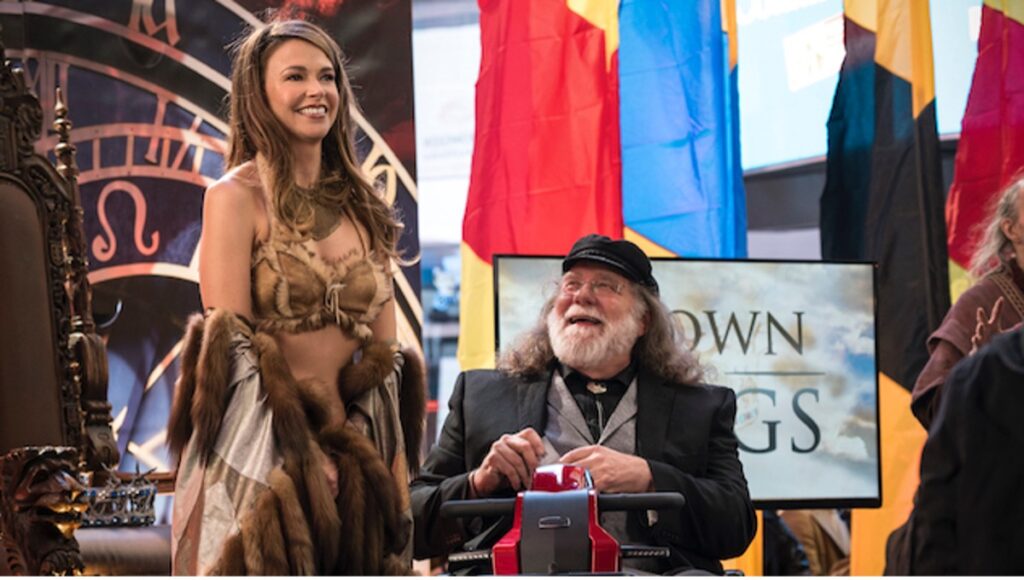
Accepting the absurdity of the show's premise, and without asking too many questions about what it means to "look" either twenty-six or forty, the main barrier to Liza's employment is language. In the pilot, she is seen interviewing for a job as an editorial assistant when a panel of twenty-something editors reel off a list of book-adjacent tech, some real and one fake, as evidence of the obstacles posed by a fifteen-year career break:
Interviewer 1: Facebook, Twitter, iPhones.
Interviewer 2: iPads, eBooks, YouTube.
Interviewer 1: Instagram, Snapchat, Skype.
Interviewer 2: Pinterest. Bang With Friends.10
Here, at least for Liza, it's not a knowledge of contemporary literature or trends that exclude her from the workplace ("I'm a terrific reader!" she innocently replies), but technology, etiquette, and slang. It doesn't help that she encounters the twenty-first century like a latter-day Rip Van Winkle. Claiming not to know about hook ups, nudes, Taylor Swift, and forms of contraception like the diaphragm that are centuries old, she also lacks the fluency in social media typically associate with the millennial, regularly forgetting what a meme is and asking colleagues how to "slip" into someone's DMs.11
As warranted and likely accurate as Younger's focus on ageism is, the show gives millennials more power than they typically hold in their famously stunted careers.12 It also forgets that they, too, could stand to be a little younger. When the show first aired, the oldest millennials were seven years younger than Liza; when the show ended in 2021, the elder millennials were turning forty, which is her age in the pilot. Emphasizing a shared ignorance of cultural references is also an easy way for relatively privileged groups to conceive of their own disadvantages. In an updated analysis of Generation X (1991), published on the novel's thirtieth anniversary, Coupland suggests that age groups, if they ever existed, find cohesion through "sentimental markers" rather than dates, adding that "there's nothing quite so micro-humiliating as making a Brady Bunch reference and the room going silent."13 Portraying the cultural references of millennials as a form of ageist gatekeeping, Younger fixates on how language codifies and excludes, shaping generational experiences of culture and technology and creating a potentially discriminatory workplace, without similarly interrogating the exclusionary dialects that have structured publishing for generations.
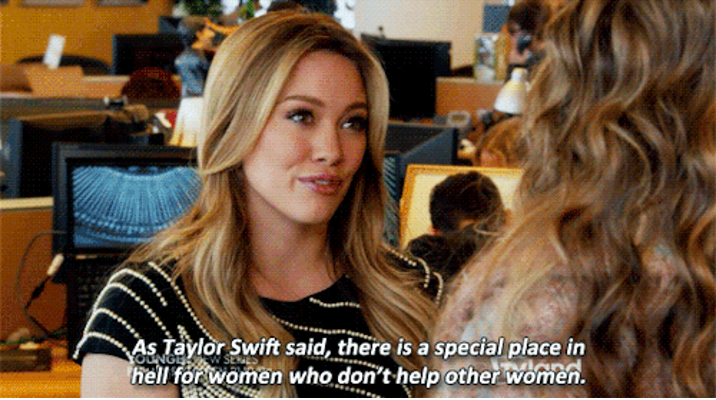
"She Walks Like a Lyric Poem"
Gradually, Younger's reliance on literary puns and references become part of its commentary on age and access. 14 Liza is portrayed as the show's "Trojan horse," a fish out of water and a layperson's entry point to the world of books.15 Yet she's hardly an outsider: Liza is incredibly well-read in canonical literatures, went to Dartmouth, and claims to have been "one of the youngest people ever to make editor [at Random House]. I was twenty-five."16 It follows that Liza's lie and the power she quickly gains at Empirical are karmically justified by the fact that she is returning to publishing after years of assumed selflessness as a wife and mother. Perhaps realistically, given the well-documented and extreme lack of diversity in publishing, the show's feminism is limited to this one note: the right to work is undisputedly central to all women's emancipation and forms of discrimination beyond ageism, including the lack of non-white authors or publishers at Empirical, are rarely mentioned.17
In this and many other ways, Younger is similar to creator Darren Star's most famous show, Sex and the City (1998-2003). Both are adaptations of books depicting aspirational pockets of the New York elite who create and sell works of art. In Sex and the City, we have Carrie's writing, Samantha Jones's PR company, and Charlotte's job as a curator; in Younger, we have the equally and fictionally glamourous world of publishing. The premise of each show, the freelance sex columnist navigating a fairly vanilla world of dating in her thirties or the forty-year-old New Jersey divorcee who lies in order to reenter publishing, also centers the career of a middle-class white women in ostensibly marginal positions, facing obstacles that don't inhibit the fantasy elements of the program. Famously, through six seasons of Sex and the City, Carrie earns enough to live in Manhattan by writing one column per week, getting catastrophically "drunk at Vogue" the one time she receives edits.18 Critics similarly note that Younger's version of publishing is glossily unrealistic, what Darcie Wilder calls "a bedtime story" that makes working in media look like a dreamscape.19
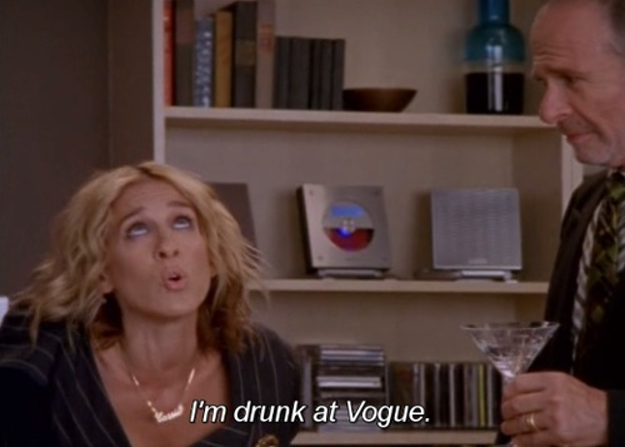
To its credit, the work of publishing is much more central to Younger than writing ever is to Sex and the City. The show's filled with the real-world lexicon of slush piles, industry awards, and low-to-no paid internships, while assistants and publishers spend most of their time in the office. Although they do so in couture, as Rachel Syme notes, the publishing to Younger pipeline is clear: "If you hear a good tidbit of gossip, you can almost guarantee it will appear in subtly fictionalized form on the next season".20 The result is incredibly literary TV. Characters whisper the name of former New York Times reviewer Michiko Kakutani and brag, incomprehensibly, about threesomes with Jay McInerney. They create GoodReads accounts for unpublished monographs to generate buzz, unironically tell a first-time author that she might have written a bestseller "like The Help," and make jokes about Amazon, Vulture, and The New Yorker: "They shouted and murmured the crap out of it."21
Despite its sensitivity to generational references, however, Younger never acknowledges how coded and self-referential the language required to enter publishing is. Well-versed in literary fiction and with an only slightly outdated history in publishing, Liza talks like she belongs at Empirical, a company whose name perhaps ironically references the value of knowledge gained through experience. While her actually twenty-six-year-old co-worker Kelsey (Hillary Duff) fights with bosses to take risks on new authors, it often seems that Liza can pretend to be twenty-six because she has the references of a middle-class white women in her early forties and because her presence, despite the fraud she commits to get the job, demands fewer changes from the workplace and its literary product.
The premise of the show reiterates this point. Although later seasons explore some of the moral quandaries of doctoring legal documents as well as the psychic weight of lying to almost everyone you know, Liza embodies a model of neoliberal motherhood that poses only minor challenges to the workplace. When Younger begins, her daughter is a senior in college and already travelling the world. Liza never has to account for her child's presence or absence; despite her ex-husband's money problems, she doesn't require child support, child care, or, as she repeatedly points out, future maternity leave.22 With her supposedly unlikely ease with children further endearing her to her bosses, Liza reflects back to her superiors what they wish to see in the literary millennial: she is hard-working, well-read in the same literatures they are, and relatively conservative in her ideas about what contemporary literary fiction should be.
"You really have no idea what a meme is."
Ultimately, Younger doesn't trash the literary millennial, so much as it privileges the so-called "thinning out" of older staff in publishing.23 The millennials Liza meets are consummate professionals. Contrary to their popular conception as lazy, pin-headed, and, if you're Brett Easton Ellis, the ruination of literary culture, Liza's colleagues work hard, staying up late reading manuscripts and diligently scrolling social media to find the newest authors and trends.24 As the show develops, ageist discriminations multiply in both directions. If Liza was once one of the youngest editors at Random House, similar levels of privilege make Kelsey the head of her own imprint before thirty. Yet, the connections and knowledge of social media that make Kelsey so valuable to Empirical eventually force her out of the company when a group of "old-school" investors disapprove of an Instagram post she accidentally shares.25 In later seasons, Liza and Kelsey are portrayed as similarly precarious: the former at risk because of her lie and the latter unmoored by the industry's attempt to replicate past success: the next Jonathan Franzen, John Updike, or J. K. Rowling.
The show's contradictions finally manifest in its best character, Diana Trout. Introduced as Liza's demanding boss, Diana is the only woman who is openly over forty at Empirical and its only marketing executive. Hers is a character that the show grows to love, but initially doesn't know what to do with. Intentionally childfree, unmarried, and horny for tall, dark, and handsome rich men, Younger mocks Diana for the nakedness of her desires, which chafe against Liza's heroic deceptions. This, too, has a literary applications. It's Diana who champions P is for Pigeon when her colleagues don't think it can sell; she's also routinely mocked because her job is more financially minded than editorial. Take, for example, this conversation between Charles and Diana, which Liza interrupts:
Charles: [To Diana] Oh, so you have read [Chinua] Achebe? What's your favorite?
Diana [To Charles]: Of the, ummm, trilogy? Oh, well . . . probably the, uhhh, second . . . book.
Liza: [picking up a box] No Longer At Ease . . .
Diana: [To Liza] Then put the box down.
Liza: [To Diana] . . . Is a great title, for the second book, don't you think? About a man, caught between two worlds. Adichie's Americanah comes close to capturing that experience, but nothing measures up to Achebe.26
Putting aside the awkwardness of the dialogue, and the audacity of describing colonization as being "caught between two worlds," Diana is shown to be flailing, her engagement with literature embarrassingly thin against Liza's purer and supposedly more youthful enthusiasm. Although it is Liza who actually and literally commits fraud, her literary knowledge is depicted as heartfelt ("I read the entire trilogy, I couldn't put it down"), while Diana, who is well-read and sophisticated in other areas, is awkwardly inauthentic.
Despite its premise, then, and as shown by its treatment of Diana and other secondary characters, Younger can be uncharitable to women with ambition.27 The show is strongest when its parodies of publishing critique the industry's obsession with both youth and tradition, but when the show forgets its own position, and particularly when it places the old guard on too high of a pedestal, it risks replicating the adversarial and hyper-privileged relationships that dominate the literary world, forgetting that neither the old nor the new can assure publishing's survival and that neither Gen X or millennials know much about Gen Z.
Rachel Sykes is Senior Lecturer in Contemporary American Literature at the University of Birmingham, where she also directs the Centre for Contemporary Literature and Culture. Rachel is the author of The Quiet Contemporary American Novel (Manchester University Press, 2017) and co-editor of the forthcoming collection Marilynne Robinson (Manchester University Press, 2022).
References
- Mark Cocker, review of H is for Hawk, by Helen Macdonald, The Guardian, 23 July, 2014; Younger, season 3, episode 2, "The Marshmallow Experiment," directed by Steven K. Tsuchida, aired October 5, 2016, on TV Land.[⤒]
- Younger, season 3, episode 3, "The Last Days of Books," directed by Tricia Brock, aired October 12, 2020, on TV Land.[⤒]
- Sheri-Marie Harrison, "'Good . . . or good considering' Bookish Television and Televised Bookishness in I May Destroy You," Post45: Contemporaries, November 2021.[⤒]
- Rachel Sykes, "Imagined Hillarys: Feminism, Fantasy, and Fictional Clintons in The Good Wife and The Good Fight," Journal of American Studies 55, no. 2 (2021): 312-355.[⤒]
- Most disastrously, when Liza and Kelsey meet an intern who identifies as genderqueer, Liza inexplicably channels the spirit of Rachel Dolezal and declares herself "age queer": "I don't identify as any age. [ . . . ] We're post-age." Younger. "Big Little Liza," season 5, episode 5, directed by Miriam Shor, aired July 10, 2018, on TV Land.[⤒]
- "Digital natives are today's young people who were born into the digital era and are growing up exposed to the continuous flow of digital information. Digital natives are a generation or population growing up in the environment surrounded by digital technologies and for whom computers and the Internet are natural components of their lives. They do not need to familiarise themselves with the technology by comparing it to something else. On the contrary, they propose new ways of thinking about how technology can be effectively used." Alexei Dingli and Dylan Seychell, "Who Are the Digital Natives?" in The New Digital Natives: Cutting the Chord (New York: Springer, 2015), 10.[⤒]
- Younger, season 1, episode 12, "The Old Ma'am and the C," directed by Tricia Brock, aired June 9, 2015, on TV Land.[⤒]
- Jia Tolentino. "Younger Is Gossip Girl for the Publishing Industry," New Yorker, June 13, 2018.[⤒]
- Generational markers are famously ill-defined, but Generation X reaches from 1965 to 1980, with millennials born between 1981 and 1996. Douglas Coupland, "Generational Trashing is Eternal," The Guardian, 19 June, 2021; Neil Howe and William Strauss, Millennials Rising: The Next Great Generation (New York: Knopf Doubleday, 2000), 2.[⤒]
- Younger, season 1, episode 1, "Pilot," directed by Darren Star, aired February 24, 2015, on TV Land. [⤒]
- Lea Eistenstein, "From Icon to Bygone: The Rise and Fall of the Diaphragm in Twentieth-Century America," senior honors thesis (University of Pennsylvania, 2019).[⤒]
- Jennifer Liu, "Older millennials made it to management — now they're wondering if they even want to be the boss," CNBC: Make It, April 22, 2021. [⤒]
- Coupland, "Generation Trashing is Eternal."[⤒]
- Younger, season 2, episode 11, "Secrets & Liza," directed by Peter Lauer, aired March 16, 2016, on TV Land.[⤒]
- I'm alluding to a reference made by Jenji Kohan, creator and showrunner of Orange is the New Black (2013-2019), when asked why Piper Chapman, an uber-privileged white woman and first-time offender, was so central to her series about a women's prison: "In a lot of ways Piper was my Trojan horse. You're not going to go into a network and sell a show on really fascinating tales of black women, and Latina women, and old women and criminals. But if you take this white girl, this sort of fish out of water, and you follow her in, you can then expand your world and tell all of those other stories." Terry Gross, "Orange Creator Jenji Kohan." Fresh Air, August 13, 2013. [⤒]
- Younger, "Pilot."[⤒]
- Richard Jean So and Gus Wezerek, "Just How White is the Book Industry?" New York Times, December 11, 2020.[⤒]
- Sex and the City, season 4, episode 17,"A Vogue Idea," directed by Martha Coolidge, aired February 3, 2002, on HBO. Outlets like Grazia and Buzzfeed calculate that Carrie would have earned around $4,000 per column (pre-tax) but would be around $1.2million in debt, due to the fact that she lives in a Manhattan apartment, never cooks or takes public transport, and claims to have spent $40,000 on Manolo Blahniks alone. Rebecca Cope, "Carrie Bradshaw would need to write this many columns to fund her shoe addiction," Grazia, March 31, 2017; Jame Jackson, "Carrie Bradshaw has $1 Million Worth of Debt," Buzzfeed, June 27, 2018. [⤒]
- Darcie Wilder, "'Younger' Makes Media Life Seem Like It's Not a Nightmare," Vice, September 15, 2017. [⤒]
- Rachel Syme, "No Trend is Spared in Younger," The New Republic, 17 August, 2018.[⤒]
- Younger, season 1, episode 10, "The Boy With the Dragon Tattoo," directed by Steven K. Tsuchisa, aired 26 May, 2015, on TV Land; season 2, episode 4, "The Jade Crusade," directed by Peter Lauer, aired 27 January, 2016, on TV Land.[⤒]
- A minor plotline, and reason for a break-up with her twenty-six year old boyfriend, is that she doesn't want any more children.[⤒]
- Younger, season 4, episode 2, "Gettin' Hygge With It," directed by Steven K. Tsuchida, aired July 5, 2017, on TV Land; see also Natasha Onwuemezi, "Grey Matters," The Bookseller, March 13, 2019.[⤒]
- Decca Aitkenhead, "The Interview: American Psycho author Bret Easton Ellis on why he hates millennials," Sunday Times, April 21, 2019[⤒]
- Younger, season 6, episode 10, "It's All About the Money, Honey," directed by Jennifer Arnold, aired August 21, 2019, on TV Land.[⤒]
- Younger, season 1, episode 5, "Girl Code," directed by Tamra Davis, aired April 21, 2015, on TV Land.[⤒]
- Charles's estranged wife Pauline (Jennifer Westfeldt) writes a thinly veiled portrait of their relationship called Marriage Vacation, fictionalizing the time she took away from their marriage and children in order to restart her writing career. Although Younger presents Liza's lie as bringing her rightful successes, Pauline's ambition is troubled, with Charles and their children struggling to forgive her implied selfishness and Pauline eventually regretting her choices.[⤒]
